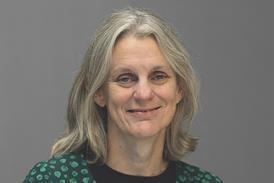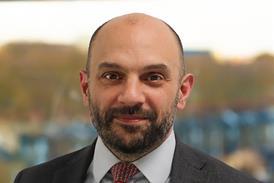New pro bono collective Oxfam Lawyers Against Poverty is working to improve legal education and boost access to justice in the central Asian republic of Tajikistan.
Launched in June this year at the Law Society, Oxfam Lawyers Against Poverty is a collective of individuals from the legal community which identifies key legal projects that will make a difference to the poorest and most vulnerable people.
These individuals pool their combined skills and funding to give people greater knowledge of their rights and provide access to justice to help them break free from poverty.
In August, I and six other members of Lawyers Against Poverty visited Tajikistan to work with the Oxfam team based in the capital Dushanbe on issues such as legal education and women’s rights.
Oxfam itself started in Tajikistan in 2001, with its programme concentrated in rural areas in the northern and southern regions of the country, where migration rates are high and farming is the principal source of employment. Oxfam’s main areas of work are safe drinking water and sanitation, economic development and improving the capacity of villagers and state institutions to respond adequately to disasters.
Oxfam also focuses on the economic and legal empowerment of rural women in Tajikistan, because these communities are some of the poorest and most disenfranchised in the region. Heavily reliant on remittances, much of Tajikistan’s male population regularly migrates to Russia for work, thereby leaving women behind to manage and provide for the households.
Another primary issue for Oxfam is that literacy rates are dropping in rural communities, and greater support is needed to support the country’s legal profession, including through education. Tajikistan’s government is working with the international community to address these issues. Measures include reforming its legal aid systems and programmes.
During our time in Tajikistan, we had the pleasure of visiting Oxfam’s projects in the communities of the southern region of Vaksh.
We met Mahmadaliev Saivali, the head of a community-based organisation (CBO) in a village called Rudaki in the Vaksh region.
A grant from Oxfam helped this CBO rebuild a local school that had been destroyed in Tajikistan’s civil war in the mid-1990s. The school reopened in 2013 and now provides an education to more than 1,000 students from the local area.
Oxfam has also worked with Mahmadaliev and the CBO to provide agricultural training, irrigation systems and seeds to local farmers. Mahmadaliev used this training to grow produce in his own garden, which he invited us to visit, allowing us to see his harvest of corn and vines laden with grapes.
We were also introduced to Mahmadaliev’s daughter, who was visiting her family with her five-month-old baby. She is currently living in Russia with her migrant husband and is training to be a nurse.
Back in Dushanbe, our delegation also met with several Tajik politicians, including Rustam Shohmurod, of the Ministry of Justice, and Mirzoev Hursandmurod, senior adviser of the presidential apparatus on legal issues. We discussed issues in Tajikistan such as women’s rights and education, and the importance of equality between men and women. These are issues already on the government’s agenda, with it having recently passed a law on the prevention of domestic violence.
We drew ministers’ attention to Oxfam’s ability to organise assistance for the government in its international negotiations. Ahead of large international summits, developed nations have teams of lawyers at their disposal in order to protect the interests of their country. However, states such as Tajikistan do not always have access to such specialist legal advice. Oxfam is able to mobilise lawyers specialised in the relevant legal area to help governments in their international discussions, such as at current climate change summits.
Diverse training
Also in Dushanbe, we met with the deans of the law faculties of the Tajik National University, Mahmadyusuf Imomov, and the Russian-Tajik Slavonic University, Nosirov Khurshed-Talibovich, to discuss legal education in the country.
We learned that the main fields of legal study in Tajikistan include criminal law, constitutional law, international law, forensic science, court procedures, finance law, transport law, human rights law and comparative law. Interestingly, in 2015, the year of the family in Tajikistan, certain universities began offering classes in women’s and children’s rights. During these legal studies, universities also offer English, German, French, Arabic and sometimes Chinese language courses. Some faculties even offer classes in international law in English. These universities in Dushanbe have exchange programmes with institutions as far afield as Armenia, Kyrgyzstan, Belarus, Iran, Russia and the US.
Case study: unregistered marriage
Najbiddinova Bibiniso is the leader of a women’s producer group called ‘Bakht’ which is supported by Oxfam’s GEM Project in Tajikistan. The Bakht producer group is made up of 18 female farmers who each have separate plots of land but collectively buy machinery and seeds which they use to grow produce including wheat, almonds, tomatoes and cucumbers. Oxfam helps Bakht to sell their produce by establishing links with purchasers and guaranteeing the sale price of their produce.
In addition to her role as the leader of Bakht, Najbiddinova is an assistant nurse at her local hospital and is head of her local community. Najbiddinova has attended a number of workshops run by Oxfam on property rights and access to justice for women and she tries to ensure that this information is disseminated to all the women in her community.
Despite the work that she does to help others, Najbiddinova has faced tragedy and legal issues of her own. Najbiddinova’s husband, who was a migrant worker, was killed in Russia. As their marriage was unregistered, Najbiddinova has been unable to access key documentation, such as her husband’s death certificate, and has been locked in a bitter legal battle with her brother-in-law regarding inheritance of her husband’s land. This has left Najbiddinova and her children facing imminent homelessness.
This is a common problem in Tajikistan. Following divorce or the death of their husbands, women are often left without official legal status which can mean that they are denied property rights, alimony and even custody of their children.
Source: Oxfam
In Tajik law faculties, around 30% of the students are women. To standardise the national level, the country recently introduced national exams for entry into legal studies. However, the fact that the exams are in Russian is an obstacle for women because at the moment the quality of Russian language studies is declining.
Therefore, it is very difficult for women, particularly those coming from rural communities, to access universities. To combat this problem, the government recently created a programme to encourage women to pursue their university studies, by providing bursaries to allow access to several universities in Dushanbe.
At the end of their studies, students generally stay in Tajikistan where they work – as barristers in the Prosecutor’s office, as academics or as school teachers.
Lawyers Against Poverty also visited Avliyoeva Zanjira, who runs a free legal advice clinic in Vaksh, supported by Oxfam. Zanjira completed her law studies at the Tajikistan University of Technology in Dushanbe. After obtaining her diploma, Zanjira worked for eight years as a lawyer before deciding to work alone, operating the mobile clinic to offer advice to villagers. During her visits, Zanjira advises around three or four clients a day, the majority of whom are women.
Sometimes, she even gives advice while the women work in the fields. Most of the cases in the legal clinic concern land or family disputes. Access to legal aid is limited, however. Zanjira represents her clients for free on these issues before the Tajik courts, as well as during mediation proceedings.
With the support of Oxfam, Zanjira also organises workshops on matrimonial rights and access to justice, in order to educate women in these communities on their rights.
Lawyers Against Poverty aims to put in place a twinning project (starting off in Tajikistan and then expanding to other countries) to link female Tajik lawyers like Zanjira with lawyers in Europe, in order to exchange ideas and find solutions together. By building bridges between Tajikistan’s legal associations and lawyers, as well as its law faculties, Lawyers Against Poverty hopes to improve the quality of access to justice, and strengthen the skill-set of Tajik lawyers by sharing best practices and supporting legal education development.
This worldwide project will be the first of its kind.
Finally, we met with Najbiddinova Bibiniso, a client of Zanjira, whose husband, a migrant worker – like an eighth of Tajikistan’s population – was killed seven years ago in Russia (see case study above). As their marriage was never registered, Najbiddinova does not have the right to access important documents, such as his death certificate. As a result, she was caught up in a legal battle with her brother-in-law regarding the inheritance of her husband’s property. Now, she and her children risk finding themselves homeless. Unregistered marriages are common in Tajikistan.
Women’s collectives
In this context, the fact that pro bono work has recently become obligatory for all lawyers in Tajikistan is an important development, which may help provide more assistance to women like Najbiddinova.
Najbiddinova is not only the head of the community, but also an assistant nurse at the local hospital and head of a group of 18 female rural producers supported by Oxfam. These successful collectives of female farmers are part of Oxfam’s Gendered Enterprise and Markets project, financed by the UK government’s Department for International Development, which gives advice on durable agriculture to women and helps the cooperatives achieve a fair price for their products.
The warm welcome and hospitality ingrained in Tajik culture were striking. We were treated to delicious lunches with some of the female producers, tasting their organic produce including watermelons, tomatoes and cucumbers.
By joining Lawyers Against Poverty, members have the opportunity to vote for legal projects, help steer the strategic direction of Lawyers Against Poverty, volunteer with us, join a working group on specific legal areas – such as legal education and women’s rights – carry out research and attend events.
As a member of the legal community – whether in academia, private practice, in-house, at the bar, in court, a law student, retired, secretary, journalist, administrator or paralegal – you can join Lawyers Against Poverty and contribute to projects such as these around the world and support Oxfam’s work ensuring access to justice and putting an end to poverty.
- For more details, go to the website.
Catherine Dunmore is an international arbitration lawyer at Hogan Lovells in Paris































No comments yet